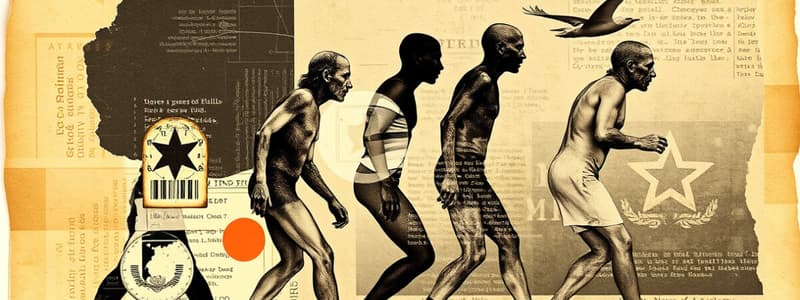Podcast
Questions and Answers
What was a critical factor in the development of larger, organized societies among early humans?
What was a critical factor in the development of larger, organized societies among early humans?
- The development of tools and control of fire (correct)
- The establishment of trade routes
- The discovery of agriculture
- The emergence of written language
Which of the following statements accurately reflects the evolution of human species?
Which of the following statements accurately reflects the evolution of human species?
- Homo sapiens could successfully breed with Homo erectus.
- All human species coexisted for millions of years without competition.
- Homo erectus thrived for approximately 2 million years. (correct)
- All other human species emerged after Homo sapiens.
How did the Agricultural Revolution change societal dynamics?
How did the Agricultural Revolution change societal dynamics?
- It resulted in an immediate return to hunter-gatherer lifestyles.
- It increased competition for resources among neighboring tribes.
- It led to a decline in the human population.
- It provided a reliable food source and enabled specialization. (correct)
What was one significant outcome of the Scientific Revolution?
What was one significant outcome of the Scientific Revolution?
What role did cooking play in human evolution?
What role did cooking play in human evolution?
What major advancements did the Industrial Revolution contribute to human progress?
What major advancements did the Industrial Revolution contribute to human progress?
Why did most other human species go extinct around 10,000 years ago?
Why did most other human species go extinct around 10,000 years ago?
How did the invention and evolution of computers impact society?
How did the invention and evolution of computers impact society?
Flashcards
Modern Human Condition
Modern Human Condition
Humans living in advanced societies with little concern for basic survival.
Agricultural Revolution
Agricultural Revolution
The period, starting about 12,000 years ago, when humans began cultivating crops and domesticating animals.
Scientific and Industrial Revolutions
Scientific and Industrial Revolutions
A period of rapid advancements in science and technology that transformed human understanding and productivity.
Cognitive Evolution
Cognitive Evolution
Signup and view all the flashcards
Homo sapiens
Homo sapiens
Signup and view all the flashcards
Homo erectus
Homo erectus
Signup and view all the flashcards
Control of Fire
Control of Fire
Signup and view all the flashcards
Development of Societies
Development of Societies
Signup and view all the flashcards
Study Notes
Human History and Evolution
- Modern humans live in a sophisticated society, unlike any previous era, with little concern for survival needs.
- The existence of Homo sapiens dates back over 200,000 years, but human history spans more than 6 million years.
- Early humans used tools approximately 2.8 million years ago, with significant progress not occurring until the control of fire.
- Cooking enabled better nutrition and facilitated brain development.
- Various human species coexisted, including Homo erectus, who thrived for 2 million years.
- All other human species, extinct around 10,000 years ago, might have vanished due to resource competition or small-scale genocides.
Development of Societies
- Development of fire and tools led to organized societies, including burial practices and cultural structures.
- Around 50,000 years ago, cognitive evolution resulted in advanced communication and cooperative strategies in larger groups.
- Anatomically modern humans likely could not have successfully bred with other hominin species due to genetic differences.
Agricultural Revolution
- Approximately 12,000 years ago, agriculture emerged, altering the dynamics of survival and specialization.
- The shift to farming provided a reliable food source, leading to population growth and the formation of villages and cities.
- Increased organizational complexity enabled the growth of kingdoms and empires, enhancing the exchange of knowledge.
Scientific and Industrial Revolutions
- The Scientific Revolution around 500 years ago spurred advancements in various fields, transforming human understanding.
- The Industrial Revolution followed, leading to exponential increases in productivity and contributions to human progress.
- The invention and evolution of computers, alongside the rise of the internet, drastically changed communication and information sharing.
Modern Impacts
- Contemporary advancements have enabled deep space exploration and insights into the universe's history.
- Humans today have transformed the planet dramatically, impacting ecosystems and other species.
- Despite advanced knowledge, human beings remain fundamentally similar to ancestors from 70,000 years ago; modern lifestyles account for a mere 0.001% of human history.
- The future remains uncertain as humanity continues to build upon precarious foundations of knowledge and existence.
Human History and Evolution
- Homo sapiens have existed for over 200,000 years; human history spans over 6 million years.
- Early humans began using tools approximately 2.8 million years ago, with significant advancements following the mastery of fire.
- Control of fire not only allowed cooking but also improved nutrition and facilitated brain growth.
- Various human species coexisted, notably Homo erectus, which thrived for approximately 2 million years.
- Extinct human species disappeared around 10,000 years ago, likely due to competition for resources or small-scale conflicts.
Development of Societies
- The advent of fire and tool-making was crucial for organizing societies, leading to burial customs and cultural evolution.
- Around 50,000 years ago, cognitive advancements led to enhanced communication and the ability to cooperate in larger group settings.
- Anatomically modern humans probably could not breed with other hominin species due to significant genetic differences.
Agricultural Revolution
- Agriculture began around 12,000 years ago, drastically changing survival strategies and specialization of labor.
- The transition to farming allowed for stable food supplies, resulting in population surges and the development of villages and cities.
- This newfound organizational complexity laid the groundwork for the rise of kingdoms and empires, fostering increased knowledge exchange.
Scientific and Industrial Revolutions
- The Scientific Revolution, occurring about 500 years ago, initiated key advancements in multiple fields that reshaped human comprehension.
- Following this, the Industrial Revolution amplified productivity and significantly propelled human progress.
- The growth and evolution of computers, along with the internet's emergence, fundamentally transformed communication and access to information.
Modern Impacts
- Recent technological advancements have made it possible to explore deep space and gain insights into the universe's history.
- Humans have dramatically altered the planet, affecting ecosystems and other species profoundly.
- Despite considerable advancements, modern humans share fundamental similarities with ancestors from 70,000 years ago; current lifestyles represent only 0.001% of human history.
- The future is uncertain as humanity progresses on fragile foundations of knowledge and existence.
Studying That Suits You
Use AI to generate personalized quizzes and flashcards to suit your learning preferences.




